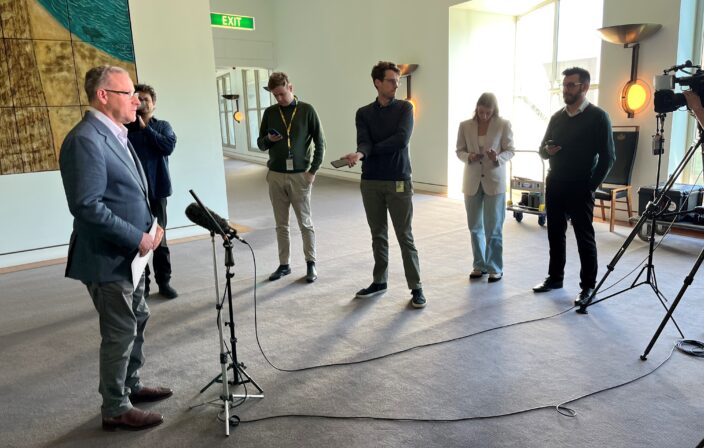Andrew McKellar interview with Thomas Oriti, ABC NewsRadio
26 Oct 2022
|Transcripts
Event: Andrew McKellar interview with Thomas Oriti, ABC NewsRadio.
Speakers: Thomas Oriti, presenter ABC NewsRadio and Andrew McKellar, chief executive Australian Chamber of Commerce and Industry.
Date: 26 October 2022
Topics: Federal budget; skills and training; economic outlook; workplace relations.
E&OE
Thomas Oriti, presenter ABC News Radio: The Australian Chamber of Commerce has labelled the Albanese government’s first Budget as modest and practical. Labor’s first budget in almost a decade forecasts real wages will not start to grow until 2024 when unemployment is tipped to have increased to 4.5 per cent. Jim Chalmers also forecast aging population and climate change will form two of the greatest challenges Australia will face in the coming years. Let’s get more on this now. Andrew McKellar is the Australian Chamber of Commerce and Industry chief executive who joins us now from our Parliament House studios in Canberra. Morning to you, Andrew.
Andrew McKellar, chief executive Australian Chamber of Commerce and Industry: Good morning, Thomas.
Thomas: You said this is a responsible budget. Why?
Andrew: We do think it is responsible. I think they have started the process of fiscal repair. So certainly, there’s a substantial improvement in the budget bottom line. It gets more challenging as you look out over the next three or four years. I think from a business point of view, we see that there are some responsible savings as part of that, but equally some very valuable investments. In particular, we are seeing that government is trying to address critical labour market challenges that we face. They’re investing in things like extended paid parental leave and additional support for childcare. These things will encourage stronger labour force participation. And also, I think very importantly, the investment in skills. Now, there’s more work to be done in those areas, but I think it’s a very good start.
Thomas: I wanted to ask you that. Australia’s reeling at the moment from widespread skills shortages. Now the government’s helping to fund quite a lot of TAFE place is 480,000. Is that enough?
Andrew: I think the important thing here is, that’s valuable. That’s very valuable, no doubt about that. But we have to recall that in fact, many or a large amount of the training that’s done out there for vocational education and training is done by private sector providers, not just TAFEs. So I think they’re an important part of the system, and we’ve got to ensure that there’s support for that. Equally apprenticeships is an area where we’ve had commencements growing over the past couple of years. We’ve got to keep that going and we’ve got to make sure that when you start something like that, you also get the chance to finish it. And I think those are a couple of areas where a bit more work needs to be done and we need to get the strategy right.
Thomas: You mentioned a minute ago, and I’m sure Jim Chalmers agrees with you, he’s made it clear the outlook, pretty bleak. Lots of global economic storm clouds. Business owners have told the ABC, we’ve obviously been covering this for a long time, that the rising cost of living has put pressure on all aspects of doing business. Is it fair enough to say, and no doubt there are challenges, but it doesn’t seem like there’s a whole lot of relief on the horizon here?
Andrew: It will be very challenging. I think the treasurer made that clear, the international, economic environment has been deteriorating. Of real concern in the Budget is the narrative around energy prices. Obviously this is a huge cost to households and a huge cost to business and there’s not a lot of relief on the horizon. So I think we are all going to face some real challenges in that space over the next two or three years.
Thomas: Energy one, fuel, food, rent, all getting more expensive. Let’s put on top of that, we’re about to cross to our report in one of the flood zones, several states battling flooding, disasters as well. Were there any missed opportunities here, has enough being done to address these very real problems faced by so many?
Andrew: The government has some work to do in this area. I think we’ve seen some useful steps in the last few months, but business will be looking for certainty about supply on the critical energy side of things, electricity and gas markets. We really do have some work to do in that area. Thomas, if I can say the other area where business has a real concern out of last night’s Budget is in the area of workplace relations. We’ll see legislation introduced tomorrow. But here I think we’ve got sort of real risks in what’s been proposed, that it will reduce the choice and control that businesses face as they’re dealing with some of those issues. It can be one size fits all. We don’t want to get into a situation where we are seeing an increased risk of industrial disputation that could lead to job losses.
Thomas: Is that a challenge? Cause I was going to ask, one of the biggest losers here seems to be workers, though real wage growth, not really expected until 2024, if that happens at all. Jim Chalmers says it’s the first step towards budget repair, but there’s a bigger job to do. Workplace relations you just mentioned. What do you see as the biggest long term challenge facing the economy?
Andrew: The narrative around wages, if we are going to get wages moving, and business supports that, then we’ve got to really restore the flexibility, the ability to negotiate agreements at the enterprise level, to link that back into productivity. If we can get productivity moving, then we will see wages going up. The risk at the moment is we’ve got a high inflation environment, we don’t want to see interest rates continuing to push up. And certainly, going back to a system where there, there’s much more centralised control with the commission, with unions, the risk of industrial disputation, that’s only going to hurt the economy. It’s not going to make it easier. We don’t want to squander the legacy that we have at the moment with an unemployment rate, which is below four per cent.
Thomas: Difficult balance though, isn’t it? Cause the treasurer says he wants to support Australians contending with higher living costs, but that risks making inflation worse. So striking that balance is a challenge.
Andrew: That’s exactly right. And this is where people struggle with the concepts of productivity, but ultimately this is the magic bullet that does allow us to get better outcomes from a business point of view, but also to pay more in terms of wages. We’ve got to really get back to a situation where we’re making some of the reforms that will make that happen.
Thomas: Okay. Andrew, it’s a pleasure. Thank you very much for joining us. Appreciate your time. Thank you.


